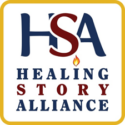by Michael Cotter.
A few years back, I was fortunate to join in as the storyteller for an experiential workshop involving a film crew, health professionals, musicians and twenty-two terminally ill people of various ages. This collaboration resulted in a powerful film, “The Healing Power of Stories, ” that documents one of the most memorable storytelling experiences of my life.
The people at this workshop were especially vulnerable, facing death from both AIDS and cancer. Not in their situation, I had to acknowledging vulnerable aspects of my own life in order to join with them.
I spent the first part of the program telling them stories. Stories combining sadness and humor provide gateways through barriers, but they need to be varied—not all humor or all sadness.
My story of the killdeer, a mother bird that stood up to my tractor and involved me in saving her nest, was a good pathway for starting. This story is not only about unequal power, but also about the tiny prevailing over the large.
Then I told of hurrying my young daughter along, worrying aloud over our slow progress across the huge fields surrounding our farm until she, looking back, pointed out how far we had already come. It felt like we all gathered together in that field that day.
The success of this workshop and film depended on us all melding as one group. By inviting them into my life and my stories, by having them walk with my daughter and me in the fields and begin to trust as the bird trusted me, we became a community. At this point, the camera operators, director, doctors and musicians seemed as vulnerable as the participants. And the people there who were terminally ill realized this was their moment and were not going to miss it.
We took a break, telling the participants that we would be back with more stories and would invite them to share their stories. A harpist called us back from break and invited us to pick up some instruments and join in the music. We became energized by the music that filled that room.
I opened the second session with a story of Ed, a man who worked for me for fifteen years, beginning when I was in my 30s and he was 65. My father had passed on long before, so Ed became a wise father figure for me. It was only after Ed’s death that I realized what I had lost and that I had never thanked him for what he had given me. So, I told them, I created the story “Rainmaker” to recall Ed’s life and talents and to allow Ed to live on for others.
One could sense the connection within the group as these people began to open up and share. One man started by telling a story of when he was working at a camp for children with Aids.
He was walking across camp with a little boy who had been giving him and the other counselors nothing but problems. They were on the way to get the child’s medications when the boy asked this man if he also needed to take meds. When the man said, “Yes, I do, ” the child slipped his small hand into the counselor’s and they walked across the dark grounds together. “We were two people facing a new life together.”
The dam broke once the sharing began. There was an empowerment that came as everyone offered some aspect of their life. That afternoon all twenty-two patients and one doctor told a story.
We can create a safe place for others to tell their stories by telling our own stories of both our vulnerable moments and humorous foibles. We can open the hearts of others to share their own life stories of both grief and grace.
Originally published in the Spring 2004 issue of the HSA Newsletter.
Michael Cotter, nationally famous storyteller and Minnesota farmer, served as artistic director for the annual Stories from the Heartland Festival, held in Austin MN.
